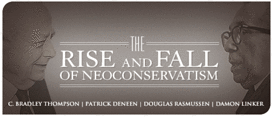I shall respond to Patrick Deneen’s reply in three separate posts. This first shall examine his intellectual method. The second will take up the substance of his essay. The third shall present my thoughts on the nature of Americanism.
One of the goals of Neoconservatism: An Obituary for an Idea is to expose the neocons’ method of thinking. Deneen’s response is a classic example of one particular instance of that method—the method by which Straussianized neocons deal with their critics. (Deneen’s method is straight out of the Straussian/neocon playbook: i.e., to falsely accuse your interlocutor of the very thing that you yourself are about to engage in.)
Observe his technique. His opening paragraph launches a series of condescending accusations, smears, and insults. At this point, one would expect Deneen to support his charges with evidence, proof, and logic. He does no such thing. Instead, he proceeds to discuss neither the substance of the book nor the essay on neoconservatism, but instead shifts the focus to his, the neocons’, and my views on the nature and meaning of Americanism, a subject that can only be meaningfully discussed in the context of the arguments presented in the book, which of course he refuses to talk about.
Deneen’s method can be summed up in three terms: ad hominem, smear, and evasion. In contrast to Deneen, I shall support my claims with evidence.
First, the ad hominem: Deneen attempts to refute the argument of my book and Cato Unbound essay by arbitrarily impugning my character (e.g., accusing me of “willful” inaccuracies, i.e., of being dishonest; nay, of making arguments “so willfully flawed to hardly merit response,” i.e., of being stupid). Second, the smear: Deneen launches a series of petty insults (I’m accused of presenting “elementary” inaccuracies, “risible” arguments “outrageous by degrees,” “jaw-dropping” accusations, “over the top” charges, “moderate to severe misinterpretations,” “incoherent imaginings,” “wishful thinking,” “distorted” and “reductive” interpretations, an “allegiance to foreign-born intellectuals,” and on and on). A smear, however, is not an argument. Third, the evasion: Deneen overloads his first paragraph with oozing condescension and fatuous accusations, but then he fails to deliver any evidence or proof to support his recriminations. Deneen conveniently evades discussing 99.9% of my book and then evades the proper meaning and substance of the remaining 0.1% that he does takes up. He willfully refuses to identify and repudiate a single argument presented in my book or essay.
And what is the presumed goal of this Trotskyist technique? By impugning my motives and character up front in such a heavy-handed way, Deneen hopes to prejudice his readers against the book and essay so that they need not bother to read either. It is a classic example of the kind of studious dissimulation practiced by Straussianized neocons and their intellectual paramours. Worse: it’s a subtle form of psychological intimidation. The clear message is this: Only the foolish can fail to see that Thompson’s argument is dishonest, false and malicious. Presumably, he thinks our readers will buy the smears and innuendo without demanding the evidence. Deneen’s intellectual method relies on the unthinking credulity of unwary readers.
Fortunately, such tactics will no longer work. One of the great virtues of Cato Unbound is that authors have the opportunity to respond to their critics. More importantly, Neoconservatism: An Obituary for an Idea has ripped the mask off neoconservative political philosophy and the rhetoric by which they defend it and attack enemies real and imagined.
Summing up: Deneen substitutes smear for evidence, vituperation for proof, dissimulation for argument, and incoherence for logic. I had expected much more from Deneen. In the future, I will know to expect less.

